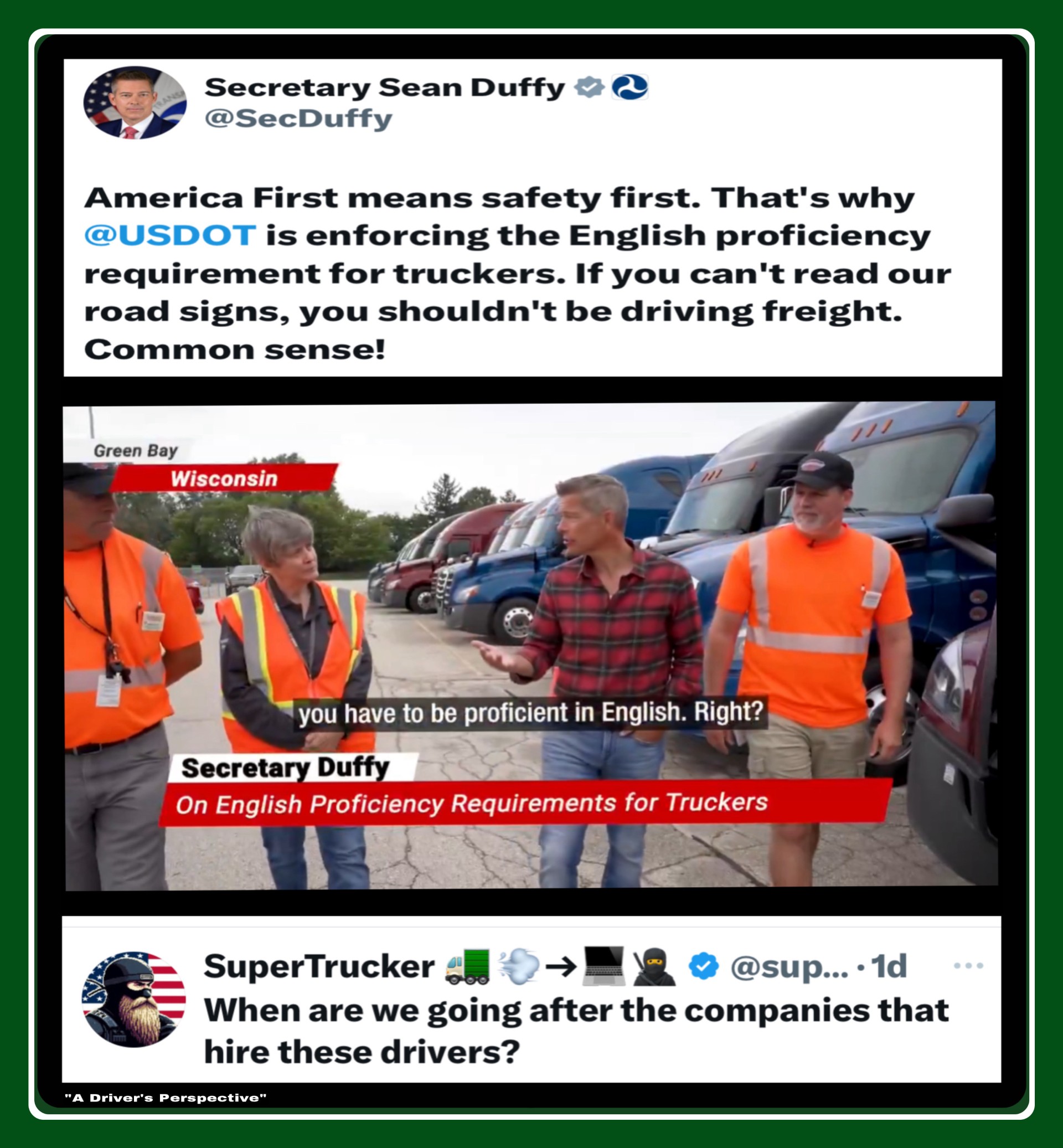
THE REAL PROBLEM
Corporations That Exploit the System
Enforcing English Isn’t Enough – It’s Time to Hold the Companies Accountable
When Secretary Sean Duffy took to social media this week to announce that the U.S. Department of Transportation is now enforcing the English proficiency requirement for truck drivers, many of us in the industry had the same initial reaction: It’s about time.
“If you can’t read our road signs, you shouldn’t be driving freight,” Duffy posted.
Simple. Clear. True. And yet – incomplete.
Because while it’s refreshing to see someone in Washington finally acknowledge the obvious dangers of putting non-English-speaking drivers behind 80,000-pound vehicles, that’s only the tip of the iceberg. The real question came from the reply section, where one user nailed the heart of the issue:
“When are we going after the companies that hire these drivers?”
The Real Problem Isn’t Just the Drivers – It’s the Corporations That Exploit the System
Let’s get something straight: no one wakes up in Guatemala, India, or Ukraine and just walks into a trucking job in America. They are brought here – often recruited, sponsored, and fast-tracked by megacarriers, staffing agencies, and labor brokers that care more about cheap labor than public safety.
And for years, those same companies have operated in a gray zone – taking full advantage of visa programs, relaxed oversight, and political silence – to flood our roads with underqualified, undertrained, and often barely English-literate drivers. Why? Because it cuts costs. Because it reduces liability. Because they know the government hasn’t had the will to enforce the rules – until now.
But if we’re going to have an honest conversation, we need to go deeper. This isn’t just a DOT issue. The rot starts long before FMCSA ever sees these drivers.
It Starts at the Department of Labor
Here’s how the scam works:
- Carriers – or the staffing firms they hide behind – file labor petitions with the U.S. Department of Labor (DOL), claiming they “can’t find enough American drivers.” These petitions are often exaggerated or outright false.
- Once the Labor Department approves the claim, it moves to Homeland Security and USCIS, where the work visa (often H-2B or similar) is granted.
- Then – and only then – does the Department of Transportation get involved. DOT and FMCSA are tasked with verifying that the driver has a valid CDL, a medical card, and meets the English proficiency standard.
That’s it. DOT doesn’t screen the labor petition. It doesn’t verify whether the labor shortage was real. By the time FMCSA steps in, the driver is already behind the wheel.
So let’s be honest – this is a labor issue first, an immigration issue second, and only then does it become a transportation issue.
The fraud – the false claims, the visa abuse, the backdoor hiring schemes – all begin at the Department of Labor. But it’s DOT that gets stuck holding the bag when these drivers can’t read a road sign, can’t follow basic safety commands, or cause a catastrophic crash.
The “English Requirement” Has Been Ignored for Years
FMCSA regulations (49 CFR §391.11) have long required drivers to be able to “read and speak the English language sufficiently to converse with the general public, to understand highway traffic signs and signals….and to make entries on reports and records. That’s not new.
What’s new is that we finally have a DOT Secretary willing to say the quiet part out loud – that English proficiency is about safety, not xenophobia, and that failing to enforce it puts everyone at risk on American highways.
But let’s not pretend this just became a problem. It’s been deliberately overlooked by both Republican and Democrat administrations. Why? Because the real culprits – the megacarriers and politically connected logistics firms – also line the pockets of politicians and bankroll the lobbying arms that shape transportation policy.
What Accountability Really Looks Like
If Secretary Duffy and the DOT are serious about safety, then enforcement must go beyond individual drivers and reach the hiring chains, recruiters, and contract firms responsible. That includes:
- Auditing carriers that consistently employ non-English-speaking or unqualified drivers
- Fining or suspending operating authority for repeat offenders
- Revoking CDLs issued through corrupt or fast-tracked testing sites
- Targeting staffing agencies that specialize in visa-based driver pipelines
- Reforming the visa system so it prioritizes safety and qualifications – not labor exploitation
You don’t solve the root of a problem by pruning leaves – you pull out the entire rotten root. And in this case, that root is corporate greed, backed by political protection and enabled by federal labor loopholes.
A Turning Point – Or Another PR Move?
The video Duffy posted shows a yellow truck weaving through traffic, paired with the caption “a lot of behavior change right now.” Let’s hope that’s not just spin. Let’s hope this marks the beginning of real, structural change in an industry where too many have looked the other way for too long.
We don’t need more photo ops. We need prosecutions.
We don’t need more tweets. We need teeth in the law.
And we certainly don’t need to keep sacrificing safe, qualified American drivers in order to appease the profit margins of billion-dollar freight companies.
America First means protecting America’s highways, America’s labor force, and America’s public safety– not just checking a box at the border.
The Bottom Line
If a driver can’t read a road sign, they shouldn’t be behind the wheel. But if a company lies to the government to get that driver here in the first place – they shouldn’t be in business.
So here’s the challenge, Secretary Duffy:
Don’t stop at English enforcement.
Start holding the companies – and the labor fraud – accountable.
Only then will we see the “behavior change” this industry – and this country – truly needs.
Will Cook | A Driver’s Perspective
